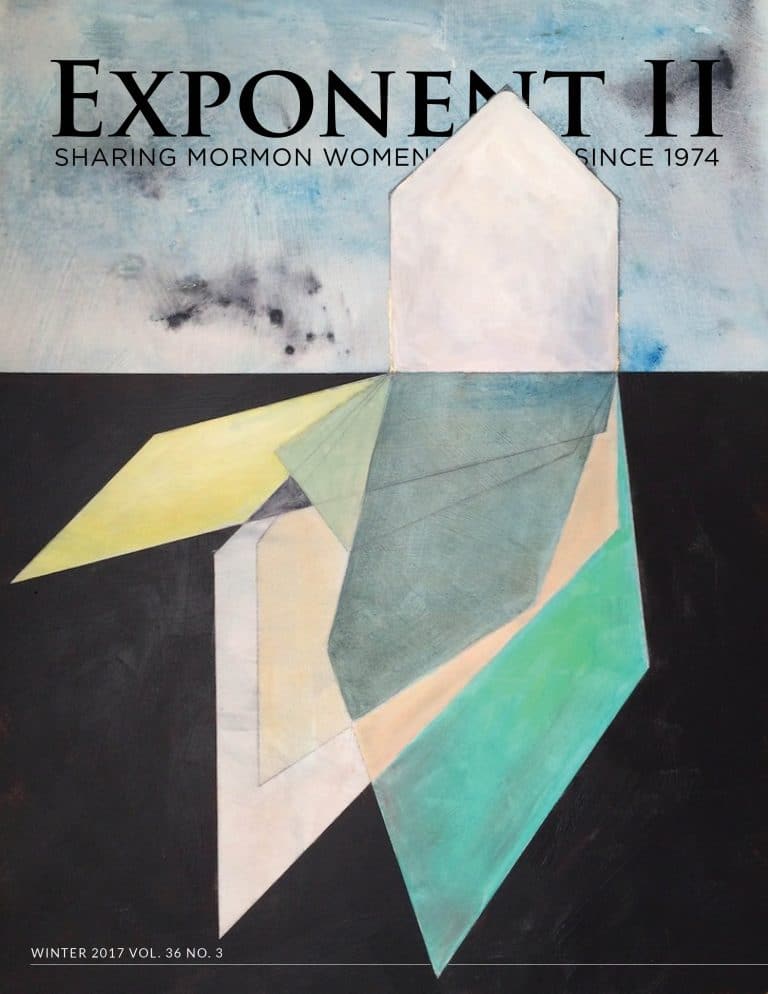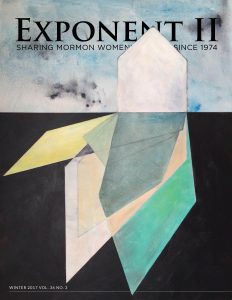The following is the Letter from the Editor for the Winter 2017 issue of Exponent II. This issue featured essays from our annual essay contest. The contest this year had a theme of “This I believe.” To receive a copy in your mailbox, subscribe by February 1. You can subscribe here. The incredible cover art of this issue is by Annie Blake. You can see more of her work here.
My 4-year-old son, Peter, is currently exploring the world of superheroes and monsters. He asks me daily questions about vampires, mummies, Superman, and Jedis. Much of his questioning is clearly based in establishing threats to himself: he asks whether witches are more powerful than ghosts and whether mummies live close to us. I try to encourage his vibrant imagination while also establishing that he is safe and has no need to fear. Yesterday he asked me if vampires are real. I told him no.
“How do you know?”
I paused. How do I know? I was in the middle of making dinner and I wasn’t sure how a discussion of epistemology would work in his preschooler brain. I quickly reviewed the range of answers I could give about how humans acquire knowledge and which of those answers would best apply to vampires. Thoughts about my own spiritual journey and current events flew through my brain. Oxford Dictionary recently selected “post-truth” as its word of the year. In the post-truth era, a time when emotional appeal has more influence than objective evidence, stating facts seems more difficult than ever. My own list of things that I know to be true seems to consistently get shorter. How did the items on that list get there? What can we, as a general society, agree on as truth? Where is the line between belief and knowledge?
Peter stood waiting. I opted, perhaps foolishly, for the simplest answer: “I know vampires aren’t real because I’ve never seen them.” A moment of silence as he digested that answer.
“Mom? Have you ever seen Jesus?”
***
In this issue, we opted to explore belief rather than knowledge. While we may have periods of being unsure of what we know and how we know it, everyone has a set of beliefs that guide their daily decisions. At times, it seems like belief has a bad reputation in our society—we want facts, we want to be absolutely sure. Belief isn’t logical. It can’t be proven. But it ought to be honored, even while we simultaneously require logic and proof in our public discourses. While my faith beliefs have brought light and goodness into my life, current events reveal a darker side of belief: when people cannot differentiate between belief and knowledge, when political opinions are clung to like religious beliefs and are inflexible in the face of evidence, there cannot be healthy public dialogue. Belief may guide us toward our better selves, but unless we are careful, it may also close up our ability to listen, learn, and change.
The submissions we published here speak to the diversity of belief but reveal clear themes of the foundational issues of the writers’ lives. In “Fortune Cookies,” Rachel Rueckert examines patriarchal blessings, faith, and “signposts that feel divine.” Abby Parcell speaks to the godliness of friendship and describes how a group of women officiate in holy capacities in “Pallbearers.” “Breath,” by Sally Gusky Kemer, takes us down the unexpected path of how belief may change dramatically and in surprising ways. Two essays—a sacrament meeting talk by Jody England Hansen and a contest submission by Lauren McMullan—consider how to receive and exercise grace in imperfect relationships. The winner of the contest, Susan Christiansen, writes in “Wendell” about how God guided her toward a unique relationship that brought goodness into her life when she desperately needed it. The strength and loveliness that shone through the essays in this issue made me cry, ponder truth, and renew my desire to believe.
At this moment, I think we all could use the healing balm of “a letter from an old friend,” as Laurel Thatcher Ulrich famously described the pages of Exponent II. Curl up under a blanket with a mug of something hot and feel the love and wisdom of these women. I’m still not sure how to explain to Peter the difference between knowledge and belief or why I believe in Jesus but not in vampires, but I do know that I’m daily grateful that I have the support of Exponent II to help me navigate complex questions and prompt me toward choosing the path of my best self.




